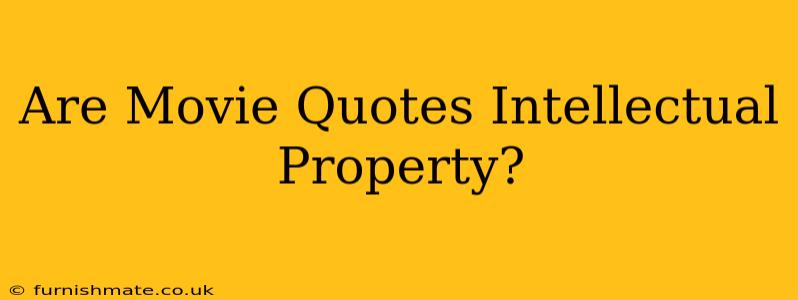Movie quotes. Those instantly recognizable snippets of dialogue that stick with us long after the credits roll. But are these beloved phrases actually protected by intellectual property laws? The answer, as with many legal questions, is nuanced. It's not a simple yes or no. Let's delve into the intricacies of copyright and fair use as they relate to movie quotes.
What is Intellectual Property (IP)?
Before we tackle movie quotes specifically, let's clarify what intellectual property encompasses. IP refers to creations of the mind, such as inventions, literary and artistic works, designs, and symbols, names, and images used in commerce. This protection prevents unauthorized use and allows creators to benefit from their work. Key types of IP include patents, trademarks, and copyrights. In the context of movies, the screenplay, music score, and visual elements are all protectable forms of IP.
Are Movie Quotes Copyrighted?
Yes, movie quotes are generally considered part of the copyrighted screenplay. The screenplay itself is the primary work protected under copyright law. This copyright protection extends to the dialogue, plot, characters, and even the overall expression of the story. This means that unauthorized reproduction of substantial portions of the screenplay, including memorable quotes, could infringe on copyright. However, the extent of this protection isn't absolute.
What Constitutes Copyright Infringement Regarding Movie Quotes?
Copyright infringement occurs when someone uses a copyrighted work without permission in a way that could harm the market for the original work. Simply quoting a line or two in casual conversation is unlikely to be considered infringement. However, using numerous quotes for commercial purposes, such as in a book, website, or merchandise, without authorization could lead to legal repercussions. The key factors courts consider include:
- The quantity of quotes used: Using a few short quotes is less likely to be infringement than using extensive passages.
- The purpose of use: Is the use transformative (adding new meaning or expression)? Is it commercial (making a profit)? Non-commercial uses are often viewed more favorably.
- The effect on the market: Does the use harm the potential market for the original movie or related products?
Does Fair Use Apply to Movie Quotes?
Fair use is a crucial exception to copyright law. It allows limited use of copyrighted material without permission for purposes such as criticism, commentary, news reporting, teaching, scholarship, or research. Whether quoting movie lines constitutes fair use depends heavily on the context and the four factors mentioned above.
What are the Four Factors of Fair Use?
The four factors used to determine fair use are:
- The purpose and character of the use: Is it transformative? Does it add new meaning or perspective?
- The nature of the copyrighted work: Is it fictional or factual? Published or unpublished?
- The amount and substantiality of the portion used: How much of the work is used? Is it the heart of the work?
- The effect of the use upon the potential market: Does it harm the market for the original?
Can I Use Movie Quotes on My Website or in My Book?
This is tricky and depends heavily on context. Using a single, short quote in a blog post analyzing a film is far more likely to be considered fair use than using dozens of quotes to create a book of movie dialogue. Always seek legal counsel if you plan to use a significant number of movie quotes commercially.
How Can I Use Movie Quotes Legally?
The safest approach is always to obtain permission from the copyright holder. This often involves contacting the studio that owns the rights to the film. For very limited, non-commercial uses, fair use may apply, but it's a defense that needs to be carefully assessed.
This information is for educational purposes only and not legal advice. Consult with a qualified attorney for advice on specific situations involving copyright and fair use. The legal landscape surrounding copyright is complex and constantly evolving.

